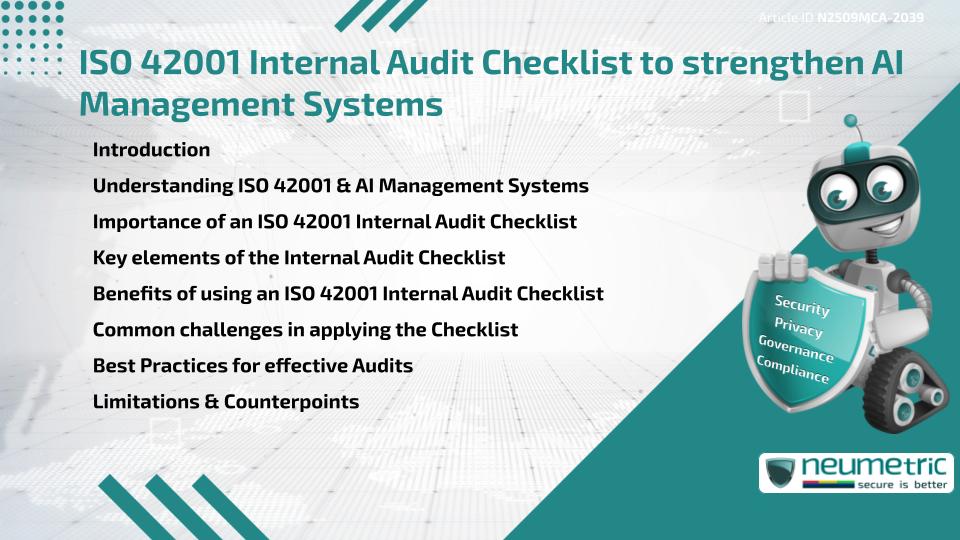Table of Contents
ToggleIntroduction
An ISO 42001 Internal Audit Checklist is an essential tool for Organisations aiming to evaluate & strengthen their AI Management Systems. It provides a structured way to measure Compliance with the International organisation for Standardisation [ISO] 42001 Framework, which emphasises responsible Governance & Risk-based thinking in Artificial Intelligence Operations. The Checklist helps identify Gaps, streamline Processes & ensure Accountability across the Organisation. This article explains the importance of an Internal Audit Checklist, its elements, benefits, challenges & best practices.
Understanding ISO 42001 & AI Management Systems
ISO 42001 is a Standard developed to guide Organisations in managing Artificial Intelligence Systems responsibly. It focuses on Ethics, Accountability, Risk Management & Continual Improvement. AI Management Systems built on ISO 42001 principles enable Businesses to reduce Risks associated with Data Handling, Algorithm Transparency & Compliance with Regulatory frameworks.
An ISO 42001 Internal Audit Checklist ensures that Organisations not only adopt these principles but also measure how well they are being implemented in practice.
Importance of an ISO 42001 Internal Audit Checklist
Audits serve as a reality check for Compliance Programs. A standardised Checklist ensures:
- Systematic review of Policies, Procedures & Controls.
- Identification of Gaps in implementation.
- Evidence-based reporting to Management & Stakeholders.
- Continuous Improvement by comparing results against previous Audits.
Without a Checklist, Audits Risk becoming inconsistent, subjective & incomplete.
Key elements of the Internal Audit Checklist
An effective ISO 42001 Internal Audit Checklist should include:
- Governance & Leadership: Assessing Top Management commitment to AI Risk Management.
- Risk Identification & Assessment: Evaluating processes for identifying AI-related Risks.
- Data Management Practices: Reviewing Data Quality, Integrity & Ethical usage.
- Algorithm Transparency: Ensuring Systems can explain Outcomes clearly.
- Compliance with Regulations: Verifying adherence to Local & International Legal Standards.
- Monitoring & Continual Improvement: Checking Feedback Loops & Corrective Actions.
- Training & Awareness: Measuring Staff competence in managing AI responsibly.
Each element helps Organisations stay aligned with ISO 42001 requirements.
Benefits of using an ISO 42001 Internal Audit Checklist
Applying an Internal Audit Checklist delivers several advantages:
- Provides clarity on Compliance status.
- Encourages Accountability at every Organisational level.
- Simplifies reporting for Management Reviews.
- Improves Resource allocation by highlighting Risk-prone areas.
- Supports Stakeholder confidence by demonstrating structured Oversight.
It functions like a Roadmap, guiding Auditors through complex AI Management processes step by step.
Common challenges in applying the Checklist
Organisations may face challenges such as:
- Resistance from Teams unfamiliar with structured Audits.
- Difficulty adapting generic Checklists to unique Organisational needs.
- Resource constraints when Audits require specialised expertise.
- Over-reliance on Checklists without critical thinking from Auditors.
Acknowledging these challenges allows teams to better prepare & tailor their Audit approach.
Best Practices for effective Audits
To maximise the value of an ISO 42001 Internal Audit Checklist, Organisations should:
- Customise the Checklist to match Business Objectives & Industry Risks.
- Train Auditors on AI-specific issues & Ethical considerations.
- Use digital tools to record, track & analyse Findings.
- Schedule Audits regularly rather than waiting for Compliance deadlines.
- Involve Cross-functional Teams for diverse Insights.
These practices ensure the Checklist is more than a formality-it becomes a practical tool for improvement.
Limitations & Counterpoints
While valuable, Checklists have limitations. They may encourage a “tick-box” mentality if not applied thoughtfully. Auditors must interpret results in context & apply judgment. Furthermore, a Checklist cannot capture all Ethical & Technical nuances of AI Systems, which require deeper evaluation beyond standardised items.
Takeaways
- An ISO 42001 Internal Audit Checklist strengthens Compliance & Oversight.
- It ensures consistent, structured evaluation of AI Management Systems.
- The Checklist highlights Risks, Inefficiencies & Areas for Improvement.
- It supports Accountability & builds Stakeholder trust.
- Best results occur when paired with skilled Auditors & ongoing Refinement.
FAQ
What is an ISO 42001 Internal Audit Checklist?
It is a structured tool that guides Auditors in evaluating Compliance with ISO 42001 standards for AI Management Systems.
Why is the Checklist important for AI Management Systems?
It ensures Systematic reviews, identifies Gaps & strengthens Accountability, making Audits more consistent & reliable.
What are the main components of the Checklist?
Governance, Risk Assessment, Data Management, Algorithm Transparency, Legal Compliance, Continual Improvement & Training.
How often should Internal Audits be conducted?
Audits should be scheduled regularly, often once or twice per year, depending on Organisational needs & Risks.
Can small Organisations use an ISO 42001 Internal Audit Checklist?
Yes, the Checklist can be scaled to fit smaller Organisations, ensuring proportional Oversight & Compliance.
Does the Checklist replace Auditor expertise?
No, the Checklist supports but does not replace Human judgment. Auditors must interpret & adapt Findings to Organisational context.
What are the common challenges with using the Checklist?
Challenges include resistance to Audits, adapting Templates, Resource limitations & over-reliance on Standard items.
Need help for Security, Privacy, Governance & VAPT?
Neumetric provides organisations the necessary help to achieve their Cybersecurity, Compliance, Governance, Privacy, Certifications & Pentesting needs.
Organisations & Businesses, specifically those which provide SaaS & AI Solutions in the Fintech, BFSI & other regulated sectors, usually need a Cybersecurity Partner for meeting & maintaining the ongoing Security & Privacy needs & requirements of their Enterprise Clients & Privacy conscious Customers.
SOC 2, ISO 27001, ISO 42001, NIST, HIPAA, HECVAT, EU GDPR are some of the Frameworks that are served by Fusion – a SaaS, multimodular, multitenant, centralised, automated, Cybersecurity & Compliance Management system.
Neumetric also provides Expert Services for technical security which covers VAPT for Web Applications, APIs, iOS & Android Mobile Apps, Security Testing for AWS & other Cloud Environments & Cloud Infrastructure & other similar scopes.
Reach out to us by Email or filling out the Contact Form…


